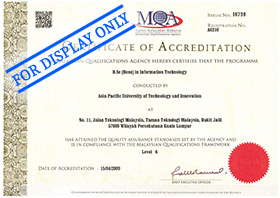You are here
Bachelor of Science (Honours) in Information Technology with a specialism in Sustainable Computing

|
|
|
APU-DMU DUAL DEGREE PROGRAMME |
MORE THAN JUST AN INFORMATION TECHNOLOGY DEGREE
APU's Bachelor of Science (Honours) in Information Technology with a specialism in Sustainable Computing degree is designed to provide you an edge with the latest technologies that are in line with the Industrial Revolution 4.0. |
ADMISSION REQUIREMENTS
GENERAL REQUIREMENTS | |
| DIRECT ENTRY TO LEVEL 1 OF THE DEGREE: | |
| STPM | • 2 Passes in STPM with minimum Grade C (GP 2.0) in any subject with a Credit in Mathematics at SPM. |
A-LEVEL | • 2 Passes in A-Level and with a Credit in Mathematics at SPM/ O-Level/ IGCSE or equivalent. |
| UEC | • 5 Grade B Passes in UEC in any subjects including Mathematics. |
FOUNDATION/ | • A pass in Matriculation or Foundation studies with minimum CGPA of 2.0 with a Credit in Mathematics at SPM/ IGCSE/ O-Level or its equivalent. |
OTHER DIPLOMAS | • Diploma in Science, Technology or Business studies with a minimum CGPA of 2.50 and with Credit in Mathematics at SPM/ IGCSE or its equivalent, can be admitted subject to rigorous assessment conducted by APU. |
| DIRECT ENTRY TO LEVEL 2 OF THE DEGREE: | |
| ICT RELATED DIPLOMAS | • Diploma in Computing related areas with a minimum CGPA of 2.50 and fulfilment of requirements for Credit Transfer is subject to approval by the APU Academic Board. |
A qualification that APU accepts as equivalent to the above.
| ENGLISH REQUIREMENTS | |
INTERNATIONAL STUDENTS | • IELTS : 5.0 |
PROGRAMME OUTLINE
This programme is specifically designed to provide students with:
- An understanding of the environmental impact of technology and promote eco-friendly practices
- The ability to design energy-efficient software and hardware, integrate renewable sources, and manage data responsibly
- An emphasis on ethical considerations, collaborations across disciplines, and advocacy for environmentally friendly technology
- Practical projects and real-world applications that will enable students to apply sustainable computing practices and measure their positive impact
| DEGREE LEVEL 1 |
Students will learn fundamental skills required by every IT professional, and the basic understanding of the underlying computer system through computer architecture, operating systems, networks, and databases. The specialized module will provide students with basic knowledge of web design and development. The modules will also help them develop personal and organizational skills, as well as nurture creativity and innovation.
COMMON MODULES | |
|
|
SPECIALISED MODULES | |
| |
| DEGREE LEVEL 2 |
A broader range of skills will be learnt, in which students will gain a better understanding of sustainable computing principles, focusing on the environmental, social, and economic aspects of computing technology. This will further delve into advanced concepts of sustainable computing, exploring topics such as green computing, sustainable technology policies, and implementing sustainable practices in an enterprise resource planning environment.
COMMON MODULES | |
|
|
SPECIALISED MODULES | |
|
|
| INTERNSHIP (16 weeks) |
Students will undertake an Internship/Industrial Training for a minimum period of 16 weeks to prepare them for a smooth transition from the classroom to the working environment.
| DEGREE LEVEL 3 |
Students will make use of their previous studies and industrial experience to extend their familiarity with the field of sustainable computing and to refine their personal and professional development. Students will focus on emerging trends in sustainable computing by exploring topics like renewable energy, digital strategies, and leadership roles in fostering sustainable business practices in organizations. A final year project requires them to investigate and develop a solution for a real-world problem- they will demonstrate their ability to combine technical knowledge, critical thinking, and analytical skills to produce a personal achievement portfolio.
COMMON MODULES | |
|
|
SPECIALISED MODULES | |
|
|
MQA COMPULSORY SUBJECTS* |
|
|
(*All students are required to successfully complete these modules as stipulated by the Malaysian Qualification Agency.) Note: The specialism will appear only in the academic transcript. | |
CAREER OPTIONS
|
|
COURSE FEES
Malaysian Students | International Students |
Year 1: RM 32,900 | Year 1: RM 33,600 (USD 7,815) |
* Fees stated here do not include Deposits and other Miscellaneous Fees. Please refer to Fee Guide for details.
MQA ACCREDITATION
(R3/0611/6/0038)(08/30)(A6210) |
Computing & Technology Degree Programmes |
- Bachelor of Science (Honours) in Information Technology
- Bachelor of Science (Honours) in Information Technology with a specialism in Information System Security
- Bachelor of Science (Honours) in Information Technology with a specialism in Cloud Engineering
- Bachelor of Science (Honours) in Information Technology with a specialism in Internet of Things (IoT)
- Bachelor of Science (Honours) in Information Technology with a specialism in Digital Transformation
- Bachelor of Science (Honours) in Information Technology with a specialism in Financial Technology (FinTech)
- Bachelor of Science (Honours) in Information Technology with a specialism in Business Information Systems
- Bachelor of Science (Hons) in Software Engineering
- Bachelor of Science (Honours) in Computer Science
- Bachelor of Science (Honours) in Computer Science with a specialism in Data Analytics
- Bachelor of Science (Honours) in Computer Science with a specialism in Digital Forensics
- Bachelor of Science (Honours) in Computer Science (Cyber Security)
- Bachelor of Computer Science (Hons) (Artificial Intelligence)



